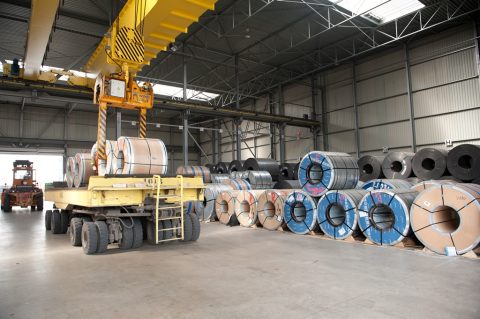
Antwerp’s breakbulk volume severely hit by trade war
The trade war and economic slowdown have negatively impacted breakbulk volumes in Antwerp. Overall breakbulk volumes including ro/ro dropped by 9% in the first nine months of this year. The throughput of conventional breakbulk, which is largely made up of steel, took the biggest hit and declined by 12.9%.
“Both imports and exports of steel are increasingly feeling the consequences of geopolitical measures that restrict the flow of trade”, the port authority states. “Only exports to Mexico and Turkey experienced growth, while imports from all producing countries suffered a decline.”
The total ro/ro volume contracted by 2.1%. The rapid decline in global car sales led to a 10% drop in the transport of new vehicles. As PCJ previously reported, this development will have a severe impact on traditional breakbulk shipping as ro/ro companies are starting to chase breakbulk and project cargo more aggressively.
The sharp decline in new vehicle shipments was partly offset by an increased volume of second-hand cars, which grew by 12%.
Total throughput
Driven by growth in the container and dry bulk segment, total throughput in the port was still up by 1.1%. Measured in TEU container volume was up by 6.4%. The growth was visible in both imports and exports as well as transhipments, Port of Antwerp states. All trading regions with the exception of Latin America recorded positive growth.
“The uncertainty in world trade has not yet had any impact on our container volume”, declared Port of Antwerp CEO Jacques Vandermeiren. “In fact it is continuing to expand, thus further consolidating our world leadership position. As a consequence, we are continuing to develop additional freight transport to the hinterland by rail and barge.”
In dry bulk, coal performed really well and was up by 9.5%. Five times as much coal was shipped through Antwerp. This was partly due to a temporary shift in transport routes as a result of low water levels in the Rhine but also because traders stocked up in anticipation of higher coal prices. Other dry bulk categories such as fertilisers, which were the highest performer in 2018, are coming under heavy pressure and are trending downwards.
Liquid bulk experienced an overall fall of 6.2% by the end of the third quarter. Crude oil volume was up by 5.5%, but chemicals were down by 5.7%. Oil derivatives experienced a slack month in August resulting in an overall decline of 9.5% by the end of the third quarter.
In total,10,814 seagoing ships called at Antwerp thus far this year.




